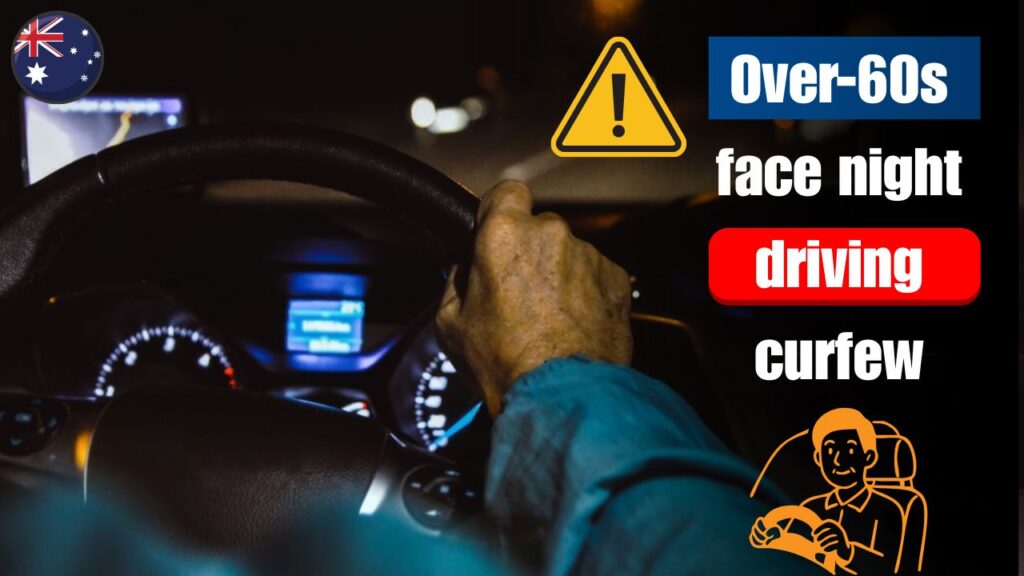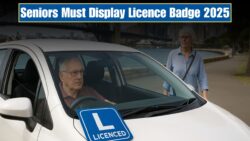Starting in 2025, Australia will introduce a new night driving curfew for citizens aged over 60, aiming to enhance road safety during late hours. This initiative comes after an increase in nighttime accidents involving senior drivers. The upcoming rule will limit night-time travel to specific hours unless an exemption applies. Many older Australians are now eager to understand how the curfew penalties, permit system, and start date will affect their daily routines and mobility needs. Here’s a full breakdown of the new curfew regulations and what they mean for senior motorists.

Australia’s New Night Driving Curfew Explained
The newly announced curfew for senior drivers over 60 will restrict driving between 10 PM and 5 AM starting from November 2025. The rule aims to reduce the risk of fatigue-related incidents and improve safety on dimly lit roads. Seniors who drive for work, medical emergencies, or caregiving purposes may apply for special exemptions. The Department of Transport has clarified that the move is preventive, not punitive, ensuring that senior road users remain protected while still retaining flexibility for essential travel. Notices and awareness campaigns will roll out nationwide before enforcement begins.
Penalties and Enforcement for Rule Violations
Drivers who breach the curfew restrictions without approved exemption could face a penalty of up to $450 fine or the loss of demerit points from their licence. Traffic officers and automated number-plate recognition systems will monitor violations, especially in urban areas with high senior driving populations. The government also plans to introduce educational programs to inform older motorists about compliance, safe night driving alternatives, and transport assistance options. However, compassionate considerations such as health emergencies will continue to be evaluated before any fines are issued.
 Australia Confirms October 2025 Start for Over-70 Licence Rules – What Seniors Must Prepare in 2025
Australia Confirms October 2025 Start for Over-70 Licence Rules – What Seniors Must Prepare in 2025
Who Is Exempt From the Curfew Rules?
Not every senior will be affected by the new curfew. Exemptions are available for those involved in essential services, volunteer work, or individuals with no alternative means of transport. Additionally, residents in regional or rural areas with limited public transit options may be granted leniency. To qualify, applicants must provide supporting documents and undergo a brief review process managed by the local transport office. The flexibility of this rule ensures that seniors can continue participating in necessary community and family activities while promoting road safety standards.
When Does the Night Curfew Start?
The official start date for Australia’s night driving curfew is set for 25 November 2025. Authorities have confirmed a three-month awareness period before fines or penalties are imposed. This phase will include public campaigns, license reminders, and postal notices to drivers above 60. By the time the rule is enforced, senior drivers will have ample time to understand curfew exemptions, register for permits, or adjust travel routines accordingly. The government hopes this transition period will ensure a smooth rollout of one of the most significant road safety reforms for older Australians in recent years.
| Category | Details |
|---|---|
| Eligible Age | Drivers aged 60 and above |
| Restricted Hours | 10 PM to 5 AM |
| Implementation Date | 25 November 2025 |
| Fine Amount | Up to $450 per violation |
| Exemption Cases | Medical, caregiving, essential services, rural areas |
| Authority Involved | Department of Transport, Australia |
 Over 62 Drivers in Australia Licence Badge must be Displayed Under 2025 Update Exceptions Listed
Over 62 Drivers in Australia Licence Badge must be Displayed Under 2025 Update Exceptions Listed
FAQ 1: When does the night curfew officially begin?
The curfew starts on 25 November 2025 after a three-month awareness period.
FAQ 2: Can seniors drive during emergencies?
Yes, emergency medical or caregiving situations are exempt from penalties.
FAQ 3: How can seniors apply for curfew exemptions?
They can submit documents to their nearest local transport office for review.
FAQ 4: Will the curfew apply across all states?
Yes, but local exemptions may differ based on state transport authorities.




